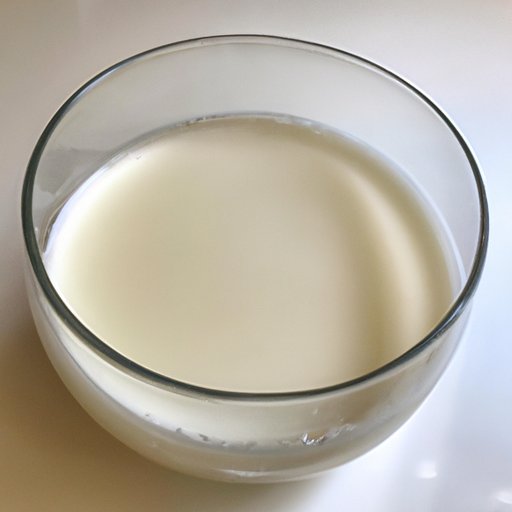
I. Introduction
Buttermilk adds a tangy flavor and moisture to baked goods, making it a staple in many kitchens. Unfortunately, not everyone has access to buttermilk at their local grocery store or may prefer to make their own at home. If you’re looking for a way to make buttermilk from scratch, you’ve come to the right place.
In this article, we’ll provide a step-by-step guide for making buttermilk at home, different ways to make it, quick tips for when you’re in a hurry, the pros and cons of homemade versus store-bought buttermilk, and culinary applications of buttermilk ranging from savory to sweet. Ready to get started?
II. A Step-by-step Guide: Making Buttermilk at Home
Making buttermilk at home is relatively straightforward and requires only a few ingredients and equipment. Here’s what you’ll need:
- 1 cup of milk (whole or low-fat)
- 1 tablespoon of white vinegar or lemon juice
- A bowl or measuring cup
- A spoon or whisk
Now, let’s get started:
- Pour 1 cup of milk into a bowl or measuring cup.
- Add 1 tablespoon of white vinegar or lemon juice to the milk.
- Stir the mixture well with a spoon or whisk.
- Let the mixture sit for 10-15 minutes, or until it starts to thicken and curdle.
- Use the buttermilk immediately or store it in the refrigerator for later use.
That’s it! You now have homemade buttermilk to use in your favorite recipes.
Here are a few tips to keep in mind:
- Use cold milk and room temperature vinegar or lemon juice for the best results.
- You can use other types of vinegar, such as apple cider or white wine, instead of white vinegar.
- If you don’t have vinegar or lemon juice, you can use cream of tartar instead.
- You can scale up or down this recipe depending on how much buttermilk you need.
III. Recipe Roundup: Different Ways to Make Buttermilk
If you’re looking for different ways to make buttermilk, you’ve got plenty of options. Here are a few recipes to consider:
1. Yogurt
Replace the milk and vinegar/lemon juice with an equal amount of plain yogurt. Stir well until smooth.
2. Sour cream
Replace the milk and vinegar/lemon juice with an equal amount of sour cream. Whisk well until combined.
3. Milk and Cream of Tartar
Replace the vinegar/lemon juice with 1 1/2 teaspoons of cream of tartar. Mix the cream of tartar with the milk first, then whisk until the mixture thickens.
4. Milk and Lemon Zest
Zest 1 lemon and mix the zest with the milk. Let the mixture sit for a few minutes to infuse the milk with lemon flavor.
IV. Quick and Easy Tips for Making Buttermilk on the Fly
When you need buttermilk in a pinch, try one of these quick and easy ideas:
- Use plain yogurt, sour cream, or kefir as a substitute.
- Mix 1 tablespoon of vinegar or lemon juice with 1 cup of milk. Let the mixture sit for 5-10 minutes.
- Use powdered buttermilk. Simply add water according to the package instructions.
V. Homemade vs. Store-bought Buttermilk: Pros and Cons
Is homemade buttermilk better than store-bought? It depends on your priorities. Here are a few things to consider:
Pros of Homemade Buttermilk
- You control the ingredients. Homemade buttermilk is free of preservatives, additives, and artificial flavors.
- You can customize the flavor. Try adding herbs, spices, or citrus zest to your homemade buttermilk for a unique twist.
- It’s cheaper. Making your own buttermilk is generally less expensive than buying it from the store.
Cons of Homemade Buttermilk
- It takes time. Making buttermilk at home requires some advance planning and 10-15 minutes of wait time.
- It may not be as thick. Homemade buttermilk may be thinner than store-bought buttermilk, depending on the ratio of milk to acid you use.
Pros of Store-bought Buttermilk
- It’s convenient. Store-bought buttermilk is readily available and doesn’t require any extra effort on your part.
- It’s consistent. Store-bought buttermilk is usually thicker and tangier than homemade buttermilk.
Cons of Store-bought Buttermilk
- It may contain additives. Store-bought buttermilk may contain stabilizers, preservatives, or other ingredients you don’t want.
- It’s more expensive. Store-bought buttermilk can be pricey, especially if you need a large quantity.
- It may not be as fresh. Store-bought buttermilk may have a shorter shelf life than homemade buttermilk.
VI. Culinary Applications of Buttermilk
Buttermilk is a versatile ingredient that can be used in a variety of ways in the kitchen. Here are a few examples:
1. Baked Goods
Buttermilk is a common ingredient in biscuits, pancakes, waffles, and muffins. It adds moisture and tenderness to the dough or batter and gives a tangy flavor.
2. Marinade
Buttermilk can be used as a marinade for chicken, pork, or fish. The acid in the buttermilk helps tenderize the meat and adds flavor. Plus, the milk proteins can help create a golden-brown crust when the meat is fried or baked.
3. Dressings and Dips
Buttermilk makes a great base for creamy dressings and dips. Try mixing it with mayonnaise, sour cream, or yogurt and adding herbs, spices, or citrus juice.
4. Soups and Stews
Buttermilk can be used as a base for creamy soups and stews. Try adding it to a potato soup, chowder, or tomato soup for extra richness and tanginess.
VII. Conclusion
Learning how to make buttermilk at home is easy and rewarding. By following our step-by-step guide, trying different recipes, and experimenting with culinary applications, you’ll be able to incorporate buttermilk into your cooking and baking with confidence. And don’t forget to use our quick tips when you’re in a hurry!
Our final suggestion? Have fun with it! Buttermilk is a classic ingredient that can be adapted to suit many different tastes and preferences. Get creative and see what you can come up with.




